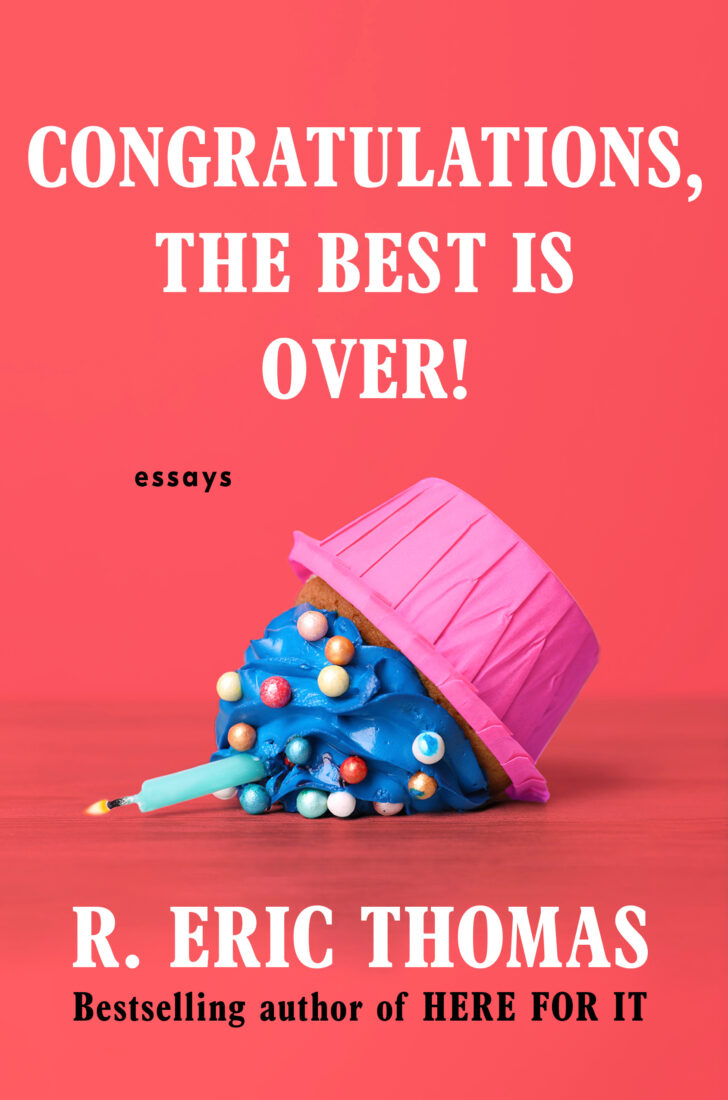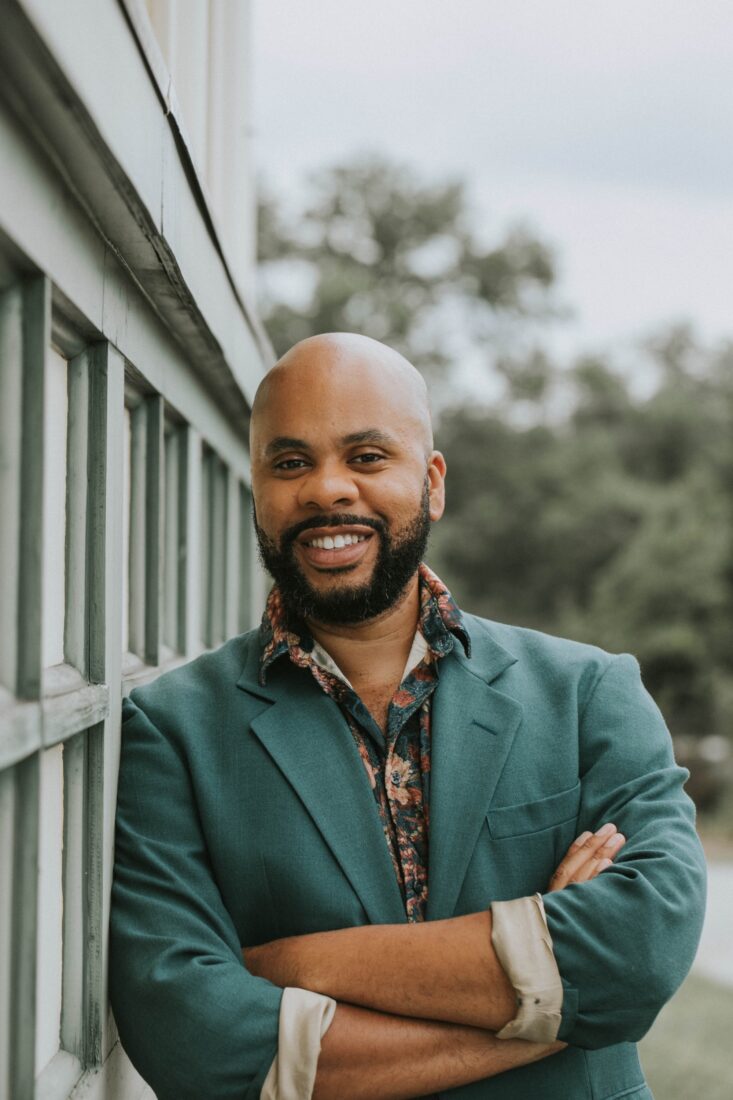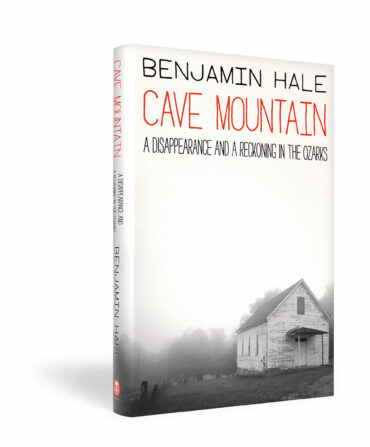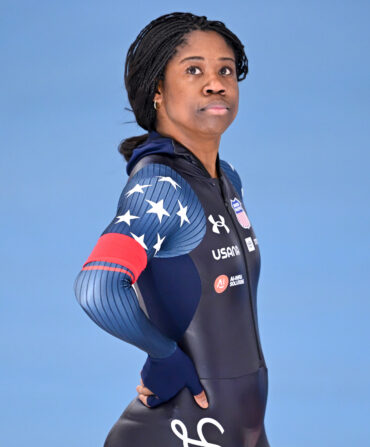To read the Baltimore native R. Eric Thomas is to find yourself wishing he lived next door so you could feign borrowing a cup of sugar just to gossip about pop culture—about trying to find Beyoncé tickets, maybe, or whom the aliens should meet with first. Thomas, after all, has an indelible voice and sense of wit about such things, one that shines in his writing. Not that he’d likely have time for a good chin wag. In the past four years alone, he’s released two books of essays—the best-selling Here for It: Or, How to Save Your Soul in America, and his new Congratulations, the Best Is Over, out August 8—as well as a young adult novel, Kings of B’more, set in his hometown; written for the stellar Apple TV+ comedy Dickinson and FX’s acclaimed Better Things; staged multiple award-winning plays; and hosted the Moth’s StorySLAM events in Philadelphia.


Somewhere in the middle of all that, Thomas and his husband, David, got called back from Philly to live in Baltimore. You could say it was divine intervention—David is a Presbyterian minister and accepted a position there. But as Thomas writes in Congratulations, “Callously, I used to quip, ‘I don’t want to move back to Baltimore even to be buried,’” and so the move back to Charm City led to more trepidation than charm. With equal parts humor and heart, he shares the journey of falling back in love with his hometown in a memoir-in-essays, along with levity-filled ruminations on marriage, grief, gardening, death, depression, and the civil unrest the past handful of years have brought to his family, and to the nation.
You’ve made a legion of fans with your hilarious writing—on social media, in your former Elle column, in your weekly newsletter. Do you feel a pressure to be funny when you meet people in person?
That’s something I literally talked about in therapy yesterday. [Laughs.] People say to my husband, “Oh, you must laugh all the time at home.” And he’s always very gracious and is like, “Oh, yeah, we do.” And I’m like, No, we don’t. I am very boring. [Laughs.] But what I have learned, and I think the process of writing books has kind of taught me, is that people come for the funny, but they stick around for the real bits. So that’s really encouraging. But you know, if I’m at a cocktail party, I’m not going to be like, “Let me tell you about the hardest thing I went through!”
I don’t know, that seems like a pretty good icebreaker to me!
I mean, you know, I do love those kinds of icebreakers! I hate small talk. So there are times when I’ll be at a dinner party, and I’ll be like that scene in Barbie where she says, “Do you ever think about dying?” [Laughs.] I love, love to just start conversations like that, but I do try to reign it in.
You have experience with a lot of different kinds of storytelling. I think it can be harder to be funny via the written word versus something that’s going to be performed, whether on stage or screen. When did you decide you wanted to be a writer, and how did that skill develop?
I always wanted to be a writer, from my earliest days as a reader. My mother would take me to the library as a kid, and we’d borrow the maximum number of books, even before I was able to read, and she’d read them all to me. I was just very captivated with being in that space. I would write little stories, but it really wasn’t until I started using social media that I realized that humor in writing was something I could do, and something I could do well. Which I think is interesting, because social media is kind of like a midway point between spoken humor and written humor.
[On social media] we still have a lot of issues with tone and intent, but there is something a little bit more immediate about, initially, posting to Facebook, and then later on, to Twitter, that really built a humor muscle in me. There are a lot of downsides to social media, but I have to thank it for giving me the boost and the confidence I needed to try to write humorously in print. I also learned how to write humor from reading humor, like David Sedaris and Tina Fey.
Your new book centers on your sometimes rocky return to Baltimore with David. What made you want to write about that journey?
Even as I was moving back to Baltimore, and I was sort of in the midst of trying to figure out, Okay, what is my life, I could see the dramatic potential in it. These questions—Can you move back home again? Who are you when you’re at home?—felt really rich to me. I hadn’t even written Here for It at that point, but I kept thinking, Oh, this is the next phase of my story.
Not to compare myself to Jonah, but I always think of Jonah being like, I don’t wanna go to Nivea! [Laughs.] Not that I think Baltimore was a whale swallowing me, but I did feel like, Oh, I know this is a good story, but I don’t wanna live through it! And then I’m like, great. Then I should probably pay a lot of attention to what’s happening. [Laughs.] And that’s where the seed began.
How do you decide what to reveal about yourself and your loved ones? When something juicy happens now, do your family and friends say, “Please don’t write about this”?
David has said to me on multiple occasions, “You can write anything you want about me.” And I was like, “You are a lunatic! You need to be locked in an insane asylum, because why would you tell that to me?” [Laughs.] But for the most part, my loved ones have developed a trust that I’m not going to tell a story that’s not mine. Or include them in a way that doesn’t feel good. My litmus test is, is this actually about me, or is it about somebody else, and I was just witnessing it?
There are so many things that I’m like, oh, that’s a hilarious story, but it’s not about me. And so I can’t talk about it. Which is so annoying. [Laughs.] That’s why I like doing live shows. Even at book talks, I’m like, “Okay, look, if we’re not recording this, I can tell you this funny story.” [Laughs.] “But you didn’t hear from me!” But I don’t want to create a life where I’m always making content. I try to be intentional about how I’m showing up in the world and how the people I love are showing up in my world.
Here at Garden & Gun, we cover Baltimore and Maryland as part of the South. Do you think it is? Do you feel Southern?
I think of Baltimore as the northernmost Southern town and the most southern Northern town. It fits so squarely into the middle of that diagram. It’s not a city where you can find, you know, sweet tea very readily. But I think the food culture feels very Southern. I think the neighborhood culture feels very, very Southern. And the sort of tenor of conversation feels very Southern. It’s a city of story and of storytelling and of rootedness.
I always feel in that middle space. And so sometimes claiming Southernness feels like stolen valor. [Laughs.] I had the chance to spend some time with Silas House, who was in your latest issue. Phenomenal. Just delightful. And I’m like, okay, now this is a person who comes naturally and honestly to Southern heritage and culture. And I’m one step removed, which has kind of been the tenor of my whole life. I just want to be in the center of the experience, and I’m on the periphery.
You’ve been exposed to so many great storytellers in addition to being one yourself, especially through hosting the Moth. What makes a good storyteller in your opinion?
I get most excited about stories where the storyteller has a sense of joy in the telling. Even if the story is not a happy story. There is something I learned growing up from my family members and in Maryland: that the act of telling a story is itself a sort of celebration. And a ritual. And so I think you have to love to tell the story.
The reason I tell stories, the reason I write books, is because I’m like, Oh man, I wanna tell this story forever. I can’t wait to tell this story. And when you love to tell a story, you also know where the really juicy parts are, the parts where you want to draw it out, whether it’s suspenseful, or it’s lingering on a joke, or you’re just pointing out the weird things that happened. Even a story you’ve told a million times, that you know by heart.
I found myself perhaps laughing hardest at the part in your new book about your adventures in gardening at your home in Baltimore—and a plague of screaming frogs that invaded a pond your husband dug.
We’ve actually moved.
Was it the frogs??
It wasn’t the frogs, it was my husband. [Laughs.] He got a new job, and so we moved back to Philadelphia. But I like that in this book, I get to always be in that garden. Even though that garden terrorized me. Here’s the thing I didn’t understand: I thought, you plant a garden, and the next year, it’s perfect. It’s Eden, it looks amazing. It’s a botanical garden! You win an award! I didn’t understand that there are two-year gardens, three-year gardens, ten-year gardens.
So that garden right now is on its third year. And in my mind, in my heart, that garden is sumptuous and lush and the cattails are high. There are hundreds of plants that we put into that garden. I want to believe they’re all thriving. I also, however, want to believe that those frogs did come back and that it was a nightmare. [Laughs.] Every night that I’m able to go to sleep in silence with the whirr of my air-conditioning and, you know, some motorbikes going up the street here in Philly, I’m like, No frogs! [Laughs.] I feel like I’m in heaven.
There’s a metaphor there, in the one- and two- and three-year gardens.
Yeah, there are things we put out into the world that we don’t get to see how it fits, how it turns out. The whole process of leaving that house made me so sad. There was a real period of mourning for both of us. I go back down to Maryland a fair amount, and it’s not on the way there—I’d have to drive thirty minutes out of my way to see the house. And you can’t really see into the backyard unless you like, pulled into the driveway. And at that point, you’re doing something aggressive, so I’m not going to do it [Laughs.] But I asked David, “Do you think we should rent a drone and fly it over the house?” And he was like, “Okay, first of all, you need to lock yourself up.” [Laughs.] So it just exists in our minds. And so much of this book is about things that don’t exist anymore, that only get to come alive again, or be or stay alive, on these pages. I didn’t think of the garden as one of those things as I was writing it, but it is, which I think is lovely.
When you are back in Baltimore, what’s an ideal day for you there?
There’s a bookstore called Greedy Reads, which I just love. They were a block from our second apartment in Baltimore. So it brings back a lot of happy memories. I always like to go to the American Visionary Art Museum. It’s where I went to one of my proms. It’s a museum full of work by people who are not formally trained. And it’s so evocative—some of the people are experiencing mental health crises; some of them are experiencing housing insecurity or homelessness. Some of them are incarcerated. It just has this electric feel to it. And it feels very Baltimore in that it is sort of an underdog kind of museum, but also full of just such immense creative beauty.
I love to eat, and Baltimore’s a really great food city. One of my favorite places to pop into is Papermoon Diner. I’ve been so many different people inside Papermoon Diner. It’s a place I used to go after the bar at like three in the morning, back in my twenties. Now I go in the middle of the day on a Sunday. All their walls are covered with action figures and toys and mannequins, so it has this kind of like frenetic John Waters feel. Which is appropriate for the city.
What are you working on next?
All of my TV stuff is on hold with the writers’ strike, which is a little scary, especially for somebody who doesn’t live in Hollywood. But without the things that the union is asking for, I don’t have a career—I don’t have a future in TV. I’m working on fiction, a novel—it’s a rom-com set in a small fictional town in Central Pennsylvania. I tell people it’s about getting a little bit older, approaching your forties, but also being like, I’ve still got some energy left! So it’s for people who like concerts, but like to sit down at concerts. [Laughs.]
Oh, wait, that’s me!
Me too! And then I have a couple of plays that are going into production this year in Buffalo, New York, Indianapolis, and Pennsylvania.
Speaking of Indianapolis, I used to live there, and so I laughed out loud when in Congratulations, you claimed the trauma of the Colts getting “Grinched” from Baltimore by Indianapolis.
It’s so funny working with a book team in New York because sometimes I’m like, I’m going to write about something very regionally specific! [Laughs.] And I do not know if you’re going to relate at all, but it’s very important! And to their credit, my editor’s like, sure. And I’m like, thank you. I have to claim the pain of this experience!
Amanda Heckert is the executive editor of Garden & Gun and the editor of the magazine’s book Southern Women. A native of Inman, South Carolina, she previously served as the editor in chief of Indianapolis Monthly and as a senior editor at Atlanta magazine. She lives in North Charleston with her husband, Justin, and their dogs, Felix and Oscar.
Garden & Gun has an affiliate partnership with Bookshop.org and may receive a portion of sales when a reader clicks to buy a book. All books are independently selected by the G&G editorial team.








